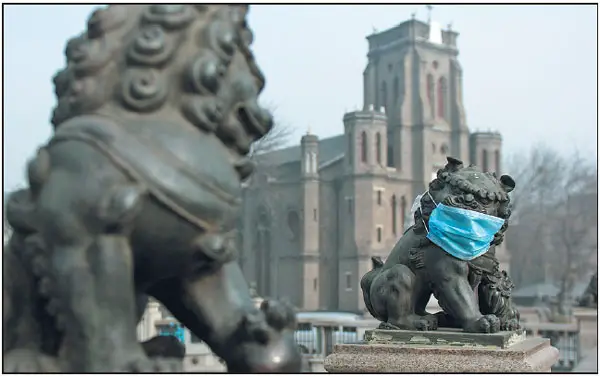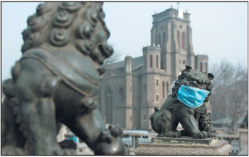Source : People's Daily
China's environment minister said he "felt guilty" and "wanted to reproach himself" aswidespread air pollution has harassed people's lives, an official statement said Saturday.
Chen Jining, minister of environmental protection, made the remarks when holding apress conference late on Friday in Beijing, introducing China's efforts on air pollutionprevention.
Since the beginning of last winter, heavy air pollution has happened repeatedly in manyplaces in China, covering large area and lasting long, which disrupted production activitiesand harassed people's everyday lives, Chen said.
The public felt anxious about the smog problem, he said.
Detailed analysis showed emissions from automobiles have became the primary source ofurban atmospheric fine particles in major cities, accounting for 31.3 percent in Beijing, 29.2 percent in Shanghai and 28 percent in Hangzhou, according to the environmentminister.
Fine particles are defined by the U.S. Environmental Protection Agency as compoundsthat have a diameter of less than or equal to 2.5 micrometers. Substances that may formthese particles come from power plants, industrial facilities, agricultural practices, motorvehicles, among others.
Chen said the ministry was evaluating 20 cities' emergency plans in dealing with heavy airpollution, hoping to improve their response ability.
The cities include Beijing, Tianjin and 18 other cities in Hebei and surrounding provinces.
Inspections had found some cities failing to take effective measures following alerts, ortheir measures were impracticable, Chen said.
The ministry will enhance supervision on whether local governments have practiced itsprecautions, according to the minister.
Chen vowed to take concrete steps and employ more stringent and effective measures todeal with outstanding environmental problems and improve environment quality.
China has been cleaning its environment and will continue to improve the response oflocal governments to pollution, Chen said.
Chen Jining, minister of environmental protection, made the remarks when holding apress conference late on Friday in Beijing, introducing China's efforts on air pollutionprevention.
Since the beginning of last winter, heavy air pollution has happened repeatedly in manyplaces in China, covering large area and lasting long, which disrupted production activitiesand harassed people's everyday lives, Chen said.
The public felt anxious about the smog problem, he said.
Detailed analysis showed emissions from automobiles have became the primary source ofurban atmospheric fine particles in major cities, accounting for 31.3 percent in Beijing, 29.2 percent in Shanghai and 28 percent in Hangzhou, according to the environmentminister.
Fine particles are defined by the U.S. Environmental Protection Agency as compoundsthat have a diameter of less than or equal to 2.5 micrometers. Substances that may formthese particles come from power plants, industrial facilities, agricultural practices, motorvehicles, among others.
Chen said the ministry was evaluating 20 cities' emergency plans in dealing with heavy airpollution, hoping to improve their response ability.
The cities include Beijing, Tianjin and 18 other cities in Hebei and surrounding provinces.
Inspections had found some cities failing to take effective measures following alerts, ortheir measures were impracticable, Chen said.
The ministry will enhance supervision on whether local governments have practiced itsprecautions, according to the minister.
Chen vowed to take concrete steps and employ more stringent and effective measures todeal with outstanding environmental problems and improve environment quality.
China has been cleaning its environment and will continue to improve the response oflocal governments to pollution, Chen said.
 Menu
Menu
 Minister feels 'guilty' for air pollution
Minister feels 'guilty' for air pollution

















